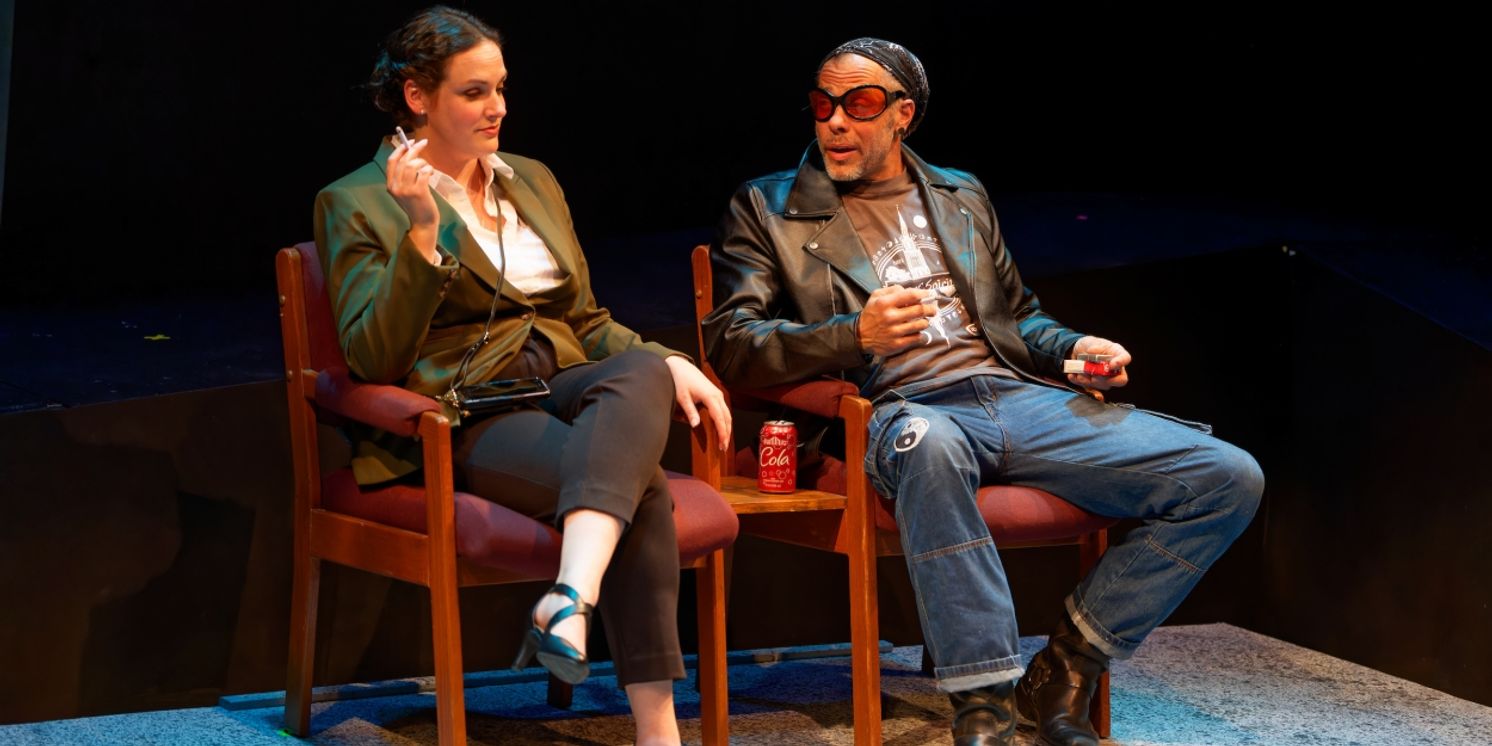Review: WAITING FOR THE MARLBORO MAN at Upstream Theater
At the Kranzberg through April 28

The remarkable Upstream Theater is approaching its twentieth season. This unfailingly excellent little company was founded by Philip Boehm as a vehicle for bringing to America plays from around the world—plays that, for the most part, make their very first American appearance at Upstream. We so need that!
Their current production, Don’t Wait for the Marlboro Man, is by a Luxembourgish playwright/dramaturg—Olivier Garofolo. The translation from the German is, of course, by Mr. Boehm himself. It opened at the Kranzberg last night under his direction.
The setting is simple indeed—a hospital waiting room with a few chairs, a settee, and a slightly mysterious coffee-vending machine. A low narrow platform and gentle ramp at the sides and back of the playing area are the narrator’s zone.
We meet Sarah as she waits for news on her—fiancé? partner?—who has had a near fatal motorcycle accident. The possibility of some organ transplant depends on the availability of a donor.
A gently aging man comes in. This is Pedro. He wears iconic biker gear: black leather jacket, head bandana, shades. He is the injured man’s biking buddy.
A narrator occasionally comments on the characters and their actions. The program lists him as “Stage Directions” and that is essentially what his speeches are. He is sometimes supported by lovely subtle wisps of guitar.
The cast consists of three of our most reliably fine St. Louis actors: Caitlin Mickey (Sarah), Isaiah di Lorenzo (Pedro), and Eric J. Conners (Stage Directions). All are at the top of their form.
Now the author has given the director and actors an unusual degree of freedom with his script. Whether stage directions are to be read by a narrator—or just left on the page—is up to the director. To make his meanings even slipperier Garafalo has written all of his dialogue with no punctuation at all (shades of e. e. cummings!). Is a given line a question or a statement or an exclamation? Somebody—actor or director—has to decide. Moreover a very great many sentences are incomplete, so that the audience must guess at what is meant. In a way there is a sort of Pinteresque feeling throughout; so much of the meaning is in what is not said.
But the play is gripping. There is a wisp of mystery in it. Only gradually and with great restraint is exposition done. We learn that Sarah is obsessed with her job and her current project, which is at some crisis point. She’s addicted to her cell-phone and would rather be focused on it than engage in chat with some stranger. Her fiancé has lost his job and can’t find another. Why does this man, who was so averse to any risk, break from the ranks of his well-organized biking group to do a high-speed wheelie into oncoming traffic?
The sense of mystery is abetted by the coffee machine. Occasionally, to indicate the passage of time, the machine makes strange grinding noises as the stage-lights momentarily dim. (It never emits a drop of coffee.)
Throughout the play there is the theme of ants. Pedro is fascinated with ants, their altruistic dedication to their colony, and their analogy to human society. From time to time he offers Sarah snacks from his tote-bag: chocolates, gummy bears, nuts, chips. He is overly interested in her job; what is it exactly, this project she’s so obsessed with and which troubles her so? We eventually learn that (as she says) “all the morally inoffensive jobs are held by men.”
So what has the Marlboro Man to do with all of this? He was a familiar figure in my youth—the hyper-masculine cowboy. To Garafalo he is someone “who answers every problem with violence.” Has Sarah been waiting for him? She’s deferred marriage and family; her barren sister urges her to hurry up and have a baby—to fulfill her destiny as “queen” ant.
At the heart of this play is some wisdom from Seneca:
“Everyone spends his life racing headlong and suffers from a longing for the future, a loathing of the present.”
Pedro is perhaps a sort of guardian angel, offering Sarah an alternative path to peace and content. Will she take it?
Now, I feel that the playwright has been culpably reckless in knowingly veiling his intentions in this work. But nevertheless it is a strange and fascinating story.
Don’t Wait for the Marlboro Man continues at the Kranzberg through April 28.
Reader Reviews
Videos

Totally agree with your take on ‘Harley Davidson and the Marlboro Man.’ It had all the ingredients to be a classic, but somehow it just missed the mark after that killer opening. Still, I can’t help but love Marlboro Man’s whole rugged vibe. Something about that shearling jacket really stuck with me—such an iconic look! After watching it again recently, I actually ended up picking up a similar one from Safyd. It’s got that same timeless, rugged feel, and I’ve been loving it on cooler days. It’s funny how movies can sometimes inspire your wardrobe in unexpected ways!